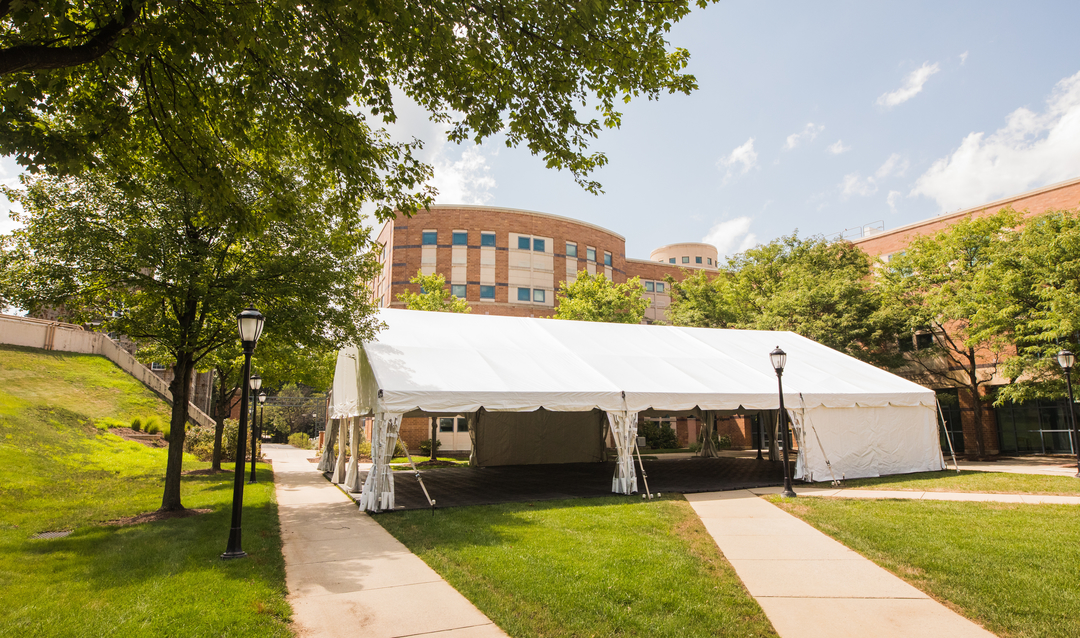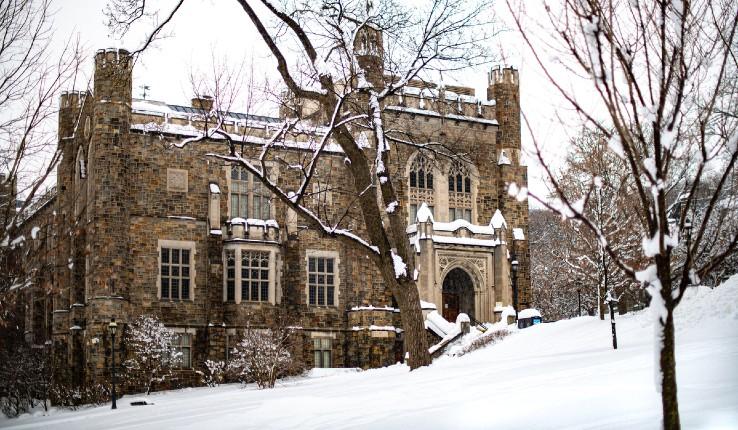Lehigh student Spencer Moros ’21 lost his grandmother to COVID-19 in March. Now, as training lieutenant with Lehigh University Emergency Medical Services (LUEMS), he is on the front lines in the university’s fight against the pandemic―helping the university to administer surveillance testing and to urge his Lehigh peers to follow safety protocols.
“This virus is real, and it's of dire importance that we help to mitigate it by socially distancing and practicing other safe habits,” Moros says. “Whether or not those around you are sick, they could still have the virus. Keep your circle small and do not take unnecessary risks.”
Moros is among approximately 12 student volunteers with LUEMS who are helping to ensure that the university’s Fall 2020 COVID-19 surveillance testing runs as smoothly and efficiently as possible. They collect samples and ensure the tests are taken properly, sanitize the test site areas and encourage everyone to wear face masks, maintain proper social distance and practice other safety protocols.
Prior to the pandemic, LUEMS was on call 24 hours a day, responding to emergency situations and managing a large group of student volunteers. Due to staffing challenges resultant of the pandemic, LUEMS is currently providing coverage only during "peak hours" weekdays, from 8 a.m. to 5 p.m. The City of Bethlehem EMS provides additional coverage during other times. LUEMS will return to normal 24/7 service in 2021.
Stephen Lewis ’04, the staff advisor to LUEMS, says Lehigh had to find a lot of qualified people in a short amount of time to help with the Fall 2020 COVID-19 surveillance testing on campus. The idea to use the group’s services came out of the Provost’s Office, he says..
In the last year, LUEMS has trained almost 150 faculty and staff members in first aid, CPR and how to use a defibrillator. Lewis says he thinks the success of that training led to LUEMS being asked to participate in the testing administration.
EMS student volunteer Thomas Perillo ’22 has been working multiple shifts at the surveillance testing site. He says he feels good about being able to help the Lehigh community in the fight against the pandemic.
“What we do is help facilitate the flow of the students who are going to be getting tested,” Perillo says. “This is the trail area that you see people walking through up to the tent and then we help with the registration of taking the test.”
Perillo says he believes that the student EMS volunteers are making a difference.
“Since we’re Lehigh students, there’s that sense of trust and maybe a little more willingness to partake and listen to us because there’s a little more accountability,” he says. “You may know one of the EMS providers that are with our school’s EMS that are giving out the test, so I think it’s been beneficial in that regard too.”
As part of the students’ EMS training, they are taught to take personal safety precautions at all times to minimize any risks to their own health. Lewis says COVID-19 serves as a reminder that safety precautions are important, but the presence of infectious disease is nothing new to the medical field.
“We just assume everything is hazardous in one way or another,” Lewis says. “And we assume everybody has something that we don’t want to catch and take appropriate safety precautions at all times.”
LUEMS has been operating since 1991 in close partnership with the Lehigh University Police Department to care for the sick and injured. LUEMS supports not only the Lehigh University community, but they also reduce the stress on the City of Bethlehem’s EMS department.
When LUEMS is called, their main responsibility is to evaluate the situation and determine if a patient requires transport to a hospital. For minor injuries, LUEMS may treat the patient and/or advise them to seek consultation from the Health Center or a family physician.
When Lehigh is fully open, the number of students volunteering for LUEMS varies each semester. According to their 2019 Year in Review, LUEMS had 57 student volunteers and four professional staff members. LUEMS arrived to 56% of all calls in five minutes or less and to 87% of all calls in eight minutes or less; and throughout the whole year, there were 112 total calls with the top call categories being traumatic injury, sick person/general illness, and fainting/unconsciousness.
While a considerable number of LUEMS volunteers are planning a medical profession, Lewis says they have always had students interested in other careers, such as business and engineering, who participate simply because they enjoy the terms of service.
"LUEMS plays an important role in the health and safety of our community," says Provost Nathan Urban. "We are grateful to the staff and students who provide such an essential service, and who are now a key component of our surveillance testing program. Their commitment to the university's efforts to mitigate the spread of COVID-19 further highlights the critical nature of their work."
Story by Ally Wolloch





